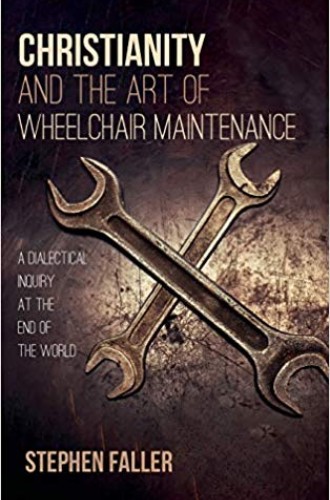A chaplain, his cerebral palsy, and the philosophy that guides him
Stephen Faller’s series of wise reflections on being alive
Three stories run through Stephen Faller’s philosophical memoir, overlapping in a way that, at a bare minimum, will make a reader say out loud, “What a remarkable person!” These threads are the narrator’s immersive understanding of Greek philosophy, his search for a vocation in ministry, and his cerebral palsy. The last came first and remains Faller’s context, condition, and companion on the journey, but never his scourge, excuse, or reason for self-pity.
The book is modeled on the countercultural philosopher Robert Pirsig’s classic book Zen and the Art of Motorcycle Maintenance. You don’t need to have been one of the five million readers of Zen in order to appreciate Faller’s work. (I wasn’t.) But it does shed light on some of Faller’s terminology and his philosophical mysticism. The same could be said about Plato, Socrates, Heraclitus, Thoreau, and Kierkegaard: they appear in the book but are not required reading. Faller’s quest for self-understanding and vocation is compelling on its own terms.
Read our latest issue or browse back issues.
Pirsig’s book tells the story of a cross-country motorcycle trip taken with his son, friends, and a shadowy figure named Phaedrus. Along the way, the narrator gives seminars on many of life’s persistent problems. Faller’s narrative follows the same structure, minus the road trip.
Both Pirsig and Faller reject the ethical imperialism of Plato’s philosophy of the forms. Despite the appearance of dialogue in Plato, the truth is already fixed. They also reject the empirical analysis and categories characteristic of Aristotle’s systematic philosophy. Many students of philosophy will disagree with Faller’s critiques of idealism and empiricism, but the sifting of his favorite philosophers is Faller’s way of figuring himself out. It’s also his way of reminding us that practitioners—chaplains, pastors, and other mechanics—are guided by ideas and theories. We owe it to ourselves to recognize them.
What Faller finds in the “historical Socrates” (as opposed to Plato’s dramatic presentation of Socrates) is the sweet spot between abstract ideas of the Good and the Beautiful, on the one hand, and the depersonalized study of how things work, on the other. Pirsig calls this balance “Quality.” In Socrates’s practice of dialectic (and by implication, in pastoral care and all meaningful human interactions), a significant encounter takes place out of which something new emerges. It is not a new idea but a new experience of being human. In genuine dialectic, the person both shapes and is shaped by other people and the shared context in which the encounter takes place.
Faller does not overburden us with case studies, but one, in particular, moved me. He is on call overnight in the hospital, which means sleeping in his clothes since in a crisis there is not enough time for a person with cerebral palsy to get dressed. He enters a trauma room where a child has just died. Surrounded by the child’s family, he must present himself to their incredible pain. He must be prepared for the agonizing dialectic of speech and silence. When the mother cradles her baby, he thinks, “Who could choose that kind of pain? . . . Those chasms are experiences to be avoided, and sometimes—sadly—endured, but never chosen. It’s ridiculous. No one chooses to lose an only child, no one can bear that. None save God.”
The chaplain himself is no stranger to pain. His ruminations are those of a man in a wheelchair. He begins his story by live-streaming the experience of driving a motorized chair, or scooter, as they have been marketed since the 1980s. “If you hit the door right, it bounces off the stopper and it will close behind you. . . . This is a sensorial experience. . . . The sound of the motor has a variable pitch, depending on how fast you are going. . . . Different doors make different sounds against the metal bumper.” He goes on to weigh the advantages of a front-wheel drive over a rear-wheel drive with their different turning radiuses, for in his world “the economy of daily life comes down to inches.”
Faller has much more to teach about the design, maintenance, and operation of a wheelchair than I can report, but the implications of this tutorial are clear. The scooter is power. For someone with a bad leg and bad arm and severely contracted musculature, there’s nothing like the freedom it offers—unless it’s a beautiful day on the Delaware Canal with your wife, Heather, the two of you gliding along in a rented kayak. No bumps there.
The wheelchair is not just a piece of equipment. It’s not merely one of the countless dualisms that frustrate human life: man versus machine. No, the scooter is an extension of its operator’s human nature, in the same way that the automobile, computer, blood-pressure cuff, and opposable thumb have become extensions of our selves and integral to human life. Socrates may have introduced Faller to the possibilities of dialectic, but with Jesus in the emergency room he discovers its true practice. As a certified representative of Christ to those who suffer, Faller discovers an alternative to his own pain and the mad scramble to avoid it at all costs. There is another way to live.
The power chair also functions as a metaphor for the other processes and systems that Faller is trying to understand. They are not mechanical, but they require skills that the author would describe as dialectical. The most important of these is falling in love and getting married. How do you make a date with a woman who, on the first phone call, misinterprets your slight speech impairment as too much alcohol? This will take some work! Their courtship begins in long hours of conversation, punctuated by longer absences for education and travel, until at last it ends in marriage.
Maintaining the scooter stands for the even longer process of acquiring an education, choosing a vocation, and working for it until it becomes a reality. The byzantine process of becoming a board-certified chaplain attests to another of cerebral palsy’s challenges: everything takes more time. Dressing, shopping, getting to class, writing, talking. Moving this slowly in a fast-paced environment is itself a countercultural activity. After eight years of work in several hospitals and 3,200 hours of hospital ministry and supervision, Faller’s quest to become a chaplain and CPE supervisor comes down to a one-hour interview conducted by a committee. It is a final exercise of dialectic, which Faller clears, one is tempted to say, like a pole-vaulter.
How shall we use this complex book? It can be read as a series of wise reflections on being alive. Some might choose to read certain sections as a broad-brushed refresher in Greek philosophy (in case you’ve forgotten how cool Heraclitus really was). Or, skimming the philosophy, you can read it as a memoir of found love and happiness; or as an account of the grueling road to chaplaincy. Without the philosophy, however, you’ll miss the underlying rationale for Faller’s dialectical life—and your own. No matter how you choose to use the book, you will cross over into another world and another life: that of the deep-thinking, slow-walking, fast-driving operator of a motorized chair, who has learned the art of life maintenance and is willing to share it with others.







